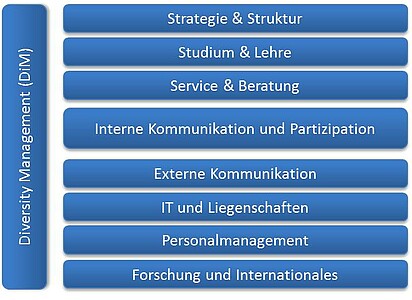Diversity concept
The topic of diversity is not new to the Ludwigshafen University of Business and Society. The idea of diversity is already anchored in many areas of the university's strategy. In 2002, the Ludwigshafen University of Business and Society was one of the first universities in Germany to be audited as a "family-friendly university". Since then, it has been re-audited 4 times. In addition, the Ludwigshafen University of Business and Society signed the "Diversity Charter" back in 2010. In this charter, it undertakes to create a working environment for all university members that is free from prejudice. The university's new mission statement was adopted in June 2014. As a central management tool, it was an important basis for deriving goals and measures for the diversity concept, alongside the "Family-friendly university" audit and the "Diversity Charter". In addition, guided interviews were conducted with members of the university from all areas.
Central diversity strategies were anchored in the mission statement, such as
- the promotion of equal opportunities and appreciation,
- the development of socio-political and educational commitment in the idea of an open university,
- promoting the compatibility of work and/or study in different life situations,
- the support of educational advancement,
- the development of diversity-oriented individual advice and support services for students,
- assuming socio-political responsibility as a public educational institution,
- promoting internationalization in the teaching staff and student body and
- creating healthy study and working conditions at the university.
These strategies were concretized in the university's fields of action in the form of goals and operationalized through implementable measures.
Figure: Fields of action of the university
Definition of the fields of action analogous to the diversity audit "Shaping diversity" but with the addition of the areas "Research and International Affairs"
This concept, which was developed in December 2014, was approved by the Senate on January 28, 2015. As part of quality assurance, the objectives and measures listed therein are to be evaluated and further developed at regular intervals.


